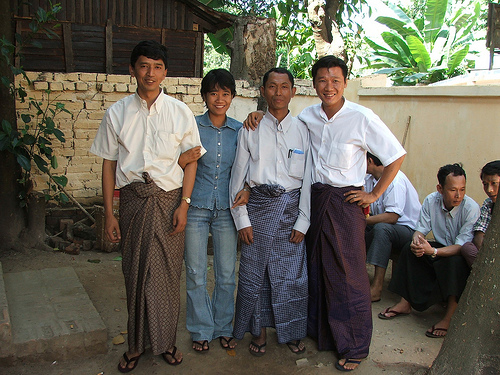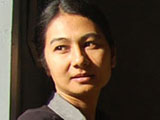Min Ko Naing: An Artist in Politics
by Khet Mar / October 18, 2012 / No comments
After spending nearly half his life in prison, the artist keeps working

Min Ko Naing (left) with fellow Burmese political prisoners in 2004. Photo: Burma Democratic Concern. Creative Commons
Everybody in Burma knows Min Ko Naing as a politician who has spent almost 20 of the 50 years of his life in different jails, but he is also a strongly political artist and writer.

- In Burma if you want to hear about issues the newspapers can’t talk
about, you should go to a tea shop. Tea houses were where I used to meet
with other activists, writers and artists, as well as where I built
friendships. Within tea houses we talked about Burmese writers, literary
trends we noticed, and, of course, politics. This online space attempts to
emulate the conversations I enjoyed in Rangoon’s tea houses. 
- Khet Mar is a journalist, novelist, short story
writer, poet, and essayist from Burma. She is the author of one novel,
Wild Snowy Night, as well as several collections of short stories,
essays and poems. Her work has been translated into English and Japanese,
been broadcast on radio, and made into a film. She is a former
writer-in-residence at City of Asylum/Pittsburgh.
The 1988 uprising was a turning point in Burma’s history as well as a turning point for thousands of university students, including Min Ko Naing. During this time, with the help of other student leaders, he re-founded the All Burma Federation of Student Unions (ABFSU), an organization that had previously been known for its struggle against British colonial rule. Min Ko Naing took responsibility as a chairman of the group.
Because of what he was doing for democracy and human rights, and doing against the military government, Min Ko Naing was sentenced to 20 years in prison when he was 26 and still a university student. In 2004, after 15 years in prison, he was released for the first time. He was detained again from September 2006 to January 2007 without any reason. He was then arrested again for taking part in peaceful demonstrations just before the Saffron Revolution and sentenced to 65 years in prison.
While he was in jail Min Ko Naing won numerous international awards for his activism. These include the 2009 Gwangju Prize for Human Rights; the 2005 Civil Courage Prize, which he shared with Anna Politkovskaya and Munir Said Thalib; the 2001 Student Peace Prize; the 2000 Homo Homini Award of People In Need; and the 1999 John Humphrey Freedom Award, which he shared with Cynthia Maung of the Mae Tao Clinic.
Although I am close with his father, the artist U Thet Nyunt, Min Ko Naing and I were not friends until his release in 2004. I visited his home often when he was in jail to ask for news about him, talk with his family members, and give them some books to take him, including the journal Moe, which I published at the time. During these visits I repeatedly heard how interested Min Ko Naing was in literature, art, and music from his family. Sometimes I had the chance to read some lyrics he wrote in prison.
We first met at an art exhibition soon after his release in 2004. As soon as he was introduced to me by one of his friends he shook my hand warmly and said: “Ah, Khet Mar! Thank you so much for the books you sent to me. They were very precious to people like me who were in prison for a long time.”
After our first encounter, we often met at literary and political events. As I remember, we talked about what he wanted to do in literature and poetry, and about how he couldn’t publish his writing legally because of who he is. On occasion, I’d see his paintings when I visited his home.
But I haven’t seen Min Ko Naing since 2007 because he was arrested again in the same year that I left Burma. In 2009, the Thailand-based Assistance Association for Political Prisoners (Burma) published his novel Rearview Mirror. I was tearful and happy when I read his book. I had a deep feeling that he was a real writer for addressing politics in his work, but I was also worried about him because of the political situation at the time, when it was dangerous for a political prisoner’s book to be published abroad.
In January 2011 I got the best present for my birthday. My friends, including Min Ko Naing, who were prisoners of conscience were released as part of a mass presidential pardon. They had all been sentenced to 65 years in prison.
I called Min Ko Naing the day after his release. When I heard him say “Hello?” on the phone I said emotionally, “This is Khet Mar.”
As soon as I finished talking he replied, “Come back home.”
I felt his response like a knife cutting a chunk out of my chest.
The political situation, especially in literature world, changed a little bit after the new government took power in 2010. Min Ko Naing’s book was published in Burma in July, 2012. The day after the book was distributed a filmmaker bought a copy intending to make it into a movie.
In 2012, Min Ko Naing won the Democracy Award from the National Endowment for Democracy (NED). I was very happy when I heard that he was coming to the US to accept the award and I thought I would get to see him. But he did not come because, although he got his passport, the former political prisoners who applied for passports with him did not get theirs. This is typical behavior for him.
Min Ko Naing has been working continuously since his release in January 2012. He visited Kachin State where the civil war happened, the conflict areas in western Burma, the delta where people are in trouble because of flooding, and central Burma to educate people about open society. I have heard him speak to people and just hearing his voice make me happy.
Still, I am even happier when I hear him include his poetry or prose within these speeches.
Translation: Khet Mar




